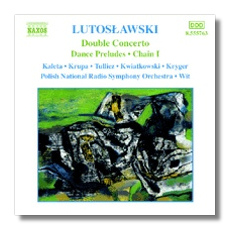
The Internet's Premier Classical Music Source
Related Links
- Latest Reviews
- More Reviews
-
By Composer
-
Collections
DVD & Blu-ray
Books
Concert Reviews
Articles/Interviews
Software
Audio
Search Amazon
Recommended Links
Site News
 CD Review
CD Review
Witold Lutosławski

Orchestral Works, Volume 8
- Dance Preludes for Clarinet and Orchestra
- Double Concerto for Oboe, Harp, and Chamber Orchestra
- Metamorphoses
- Chain I
- Two Children's Songs
- Six Children's Songs
Zbigniew Kaleta, clarinet
Arkadiusz Krupa, oboe
Nicolas Tulliez, harp
Rafał Kwiatkowski, cello
Urszula Kryger, soprano
Polish National Radio Symphony Orchestra/Antoni Wit
Naxos 8.555763 DDD 58:17
There is an air of tying loose ends together with this release, which is Volume 8 in Naxos' series of Witold Lutosławski's orchestral works. (All of the recordings were made in 2001.) That's not to say that the music is marginal. Chain I, written in 1983, is masterful. Lutosławski composed several works with this designation, which indicates nothing more than the episodic linking of unrelated musical ideas. The first Chain was composed for fourteen members of the London Sinfonietta, yet it is remarkable what fullness of sound Lutosławski achieves. The music is spiky, restless, funny/frightening, and as changeable as the whims of a cat.
The five Dance Preludes (1953, but orchestrated later) are in many clarinetists' repertoires. This is Lutosławski in his post-Bartók phase, before his own voice had fully developed. This is folk music with incorrect notes (but not too incorrect!), which is another way of saying that it is "safe" 20th-century music. The Double Concerto was written in 1980 for Heinz and Ursula Holliger, who recorded it memorably shortly thereafter. (Krupa and Tulliez aren't as pointed as the husband-and-wife team; Tulliez, in fact, fades into the background more than he ought to.) Its unquiet mood is similar to that of Chain I.
The other works were new to me. Metamorphoses, for cello and thirteen strings, was written in 1982. Less than six minutes long, it is a memorial to a Polish musicologist whose enthusiasm for Debussy's Pelléas is evoked by the work's opening moments. Soloist Kwiatkowski plays it angrily, with what a cellist friend of mine calls "buzz-saw vibrato." The two sets of children's songs are charming and minor – very early Lutosławski. Unfortunately, Naxos hasn't included texts and translations, so one isn't able to evaluate the composer's word-setting skills. Kryger sings them without affectation.
By now, Naxos must have amassed the most complete Lutosławski collection on CD. While it is good to hear the composer's own recordings, Wit's series has been consistently well-played and inexpensive, and there's never been an easier way to follow the career of this expressive yet very modern Polish composer closely.
Copyright © 2003, Raymond Tuttle


















